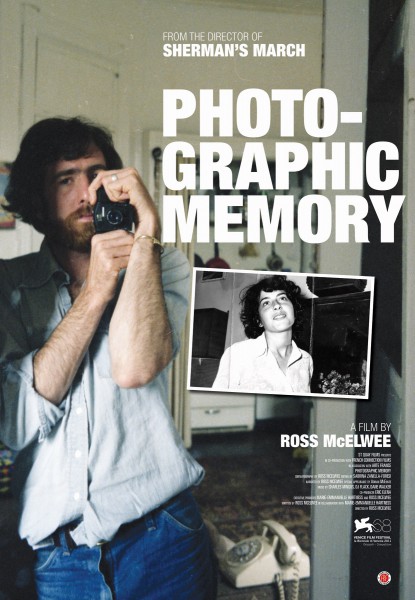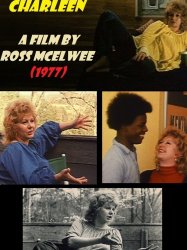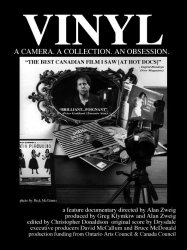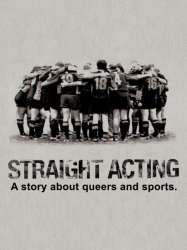Photographic Memory is a american film of genre Documentary directed by Ross McElwee released in USA on 12 october 2012 with Ross McElwee
Photographic Memory (2011)

If you like this film, let us know!
Released in USA 12 october 2012
Length 1h24
Directed by Ross McElwee
OriginUSA
Genres Documentary
Themes Documentary films about business, Documentary films about the visual arts, Documentary films about the film industry, Documentaire sur une personnalité, Autobiographical documentary films
Rating68%










Photographic Memory is a 2011 documentary film by independent filmmaker Ross McElwee about a voyage back to the roots of his involvement with the camera.
Photographic Memory premiered at the 2011 Venice Film Festival.
Synopsis
The filmmaker finds himself in frequent conflict with his son, who is no longer the delightful child the father loved, but an argumentative young adult who inhabits virtual worlds available through the internet. To the father, the son seems to be addicted to and permanently distracted by those worlds. The filmmaker undertakes a journey to St. Quay-Portrieux in Brittany where he worked for a spring as a wedding photographer’s assistant at age 24 –slightly older than his son is now. He has not been back to St. Quay since that visit, and hopes to gain some perspective on what his own life was like when he was his son’s age. He also hopes to track down his former employer, a fascinating Frenchman named Maurice, and Maud, a woman with whom he was romantically involved during that spring 38 years ago. Photographic Memory is a meditation on the passing of time, the praxis of photography and film, digital versus analog, and the fractured love of a father for his son.Actors

Ross McElwee
(Himself)
Comments
Leave comment :
Suggestions of similar film to Photographic Memory
There are 5 films with the same actors, 5 films with the same director, 8975 with the same cinematographic genres, 2961 films with the same themes (including 1 films with the same 5 themes than Photographic Memory), to have finally 70 suggestions of similar films.If you liked Photographic Memory, you will probably like those similar films :

Time Indefinite (1993)
, 1h54Directed by Ross McElwee
Genres Documentary
Themes Documentary films about business, Documentary films about the film industry, Documentaire sur une personnalité, Autobiographical documentary films
Actors Ross McElwee, Robert Gardner
Rating76%





In the film, director Ross McElwee gets married, finally putting an end to his family's worrying; his grandmother dies; his wife Marilyn has a miscarriage; and his father, a medical doctor, dies suddenly within a week of McElwee's wife's miscarriage. His mother had died of cancer ten years earlier and so McElwee returns to his father's house, where his father's housekeeper ministers to him about Christianity and faith.
 , 59minutes
, 59minutesDirected by Ross McElwee
Genres Documentary
Themes Films about writers, Documentaire sur une personnalité
Actors Ross McElwee
Rating72%






Bright Leaves (2004)
, 1h47Directed by Ross McElwee
Genres Documentary
Themes Films about families, Documentaire sur une personnalité
Actors Patricia Neal, Ross McElwee, Gary Cooper
Rating70%





Ross McElwee retrouve sa Caroline du Nord natale pour remonter la piste fort romanesque de son histoire familiale. Il part sur les traces de son arrière-grand-père, riche propriétaire de plantation de tabac, ruiné par un concurrent trop habile.

Six O'Clock News (1997)
, 1h43Directed by Ross McElwee
Origin USA
Genres Documentary
Themes Films about television
Actors Ross McElwee, Josh Kornbluth
Rating70%






Sherman's March (1986)
, 2h35Directed by Ross McElwee
Origin USA
Genres Musical theatre, Documentary
Actors Ross McElwee, Burt Reynolds
Rating71%





McElwee a initialement prévu de faire un film au sujet des effets de la marche du général William Tecumseh Sherman à travers la Géorgie et les Carolines (généralement appelée Marche de Sherman vers la mer) durant la guerre civile américaine.

Fortunate Son (2012)
Directed by Tony Asimakopoulos
Origin Canada
Genres Documentary
Themes Films about families, Documentary films about business, Documentary films about the film industry, Documentaire sur une personnalité, Autobiographical documentary films
Rating76%






In the Bathtub of the World (2001)
, 1h13Directed by Caveh Zahedi
Origin USA
Genres Documentary
Themes Documentary films about business, Documentary films about the film industry, Documentaire sur une personnalité, Autobiographical documentary films
Actors Caveh Zahedi, Richard Linklater, Tommy Pallotta
Rating59%






Vinyl (2000)
Genres Documentary, Musical
Themes Documentary films about business, Documentary films about the film industry, Documentaire sur une personnalité, Autobiographical documentary films
Actors Harvey Pekar, Don McKellar, Bruce LaBruce, Guy Maddin
Rating71%






Straight Acting (2005)
Genres Documentary
Themes Films about sexuality, LGBT-related films, Documentary films about business, Documentary films about the film industry, Documentaire sur l'homosexualité, Documentaire sur une personnalité, Autobiographical documentary films
Rating56%






Walk Away Renee (2011)
, 1h30Directed by Jonathan Caouette
Origin USA
Genres Drama, Documentary
Themes Medical-themed films, Documentary films about business, Documentary films about the film industry, Documentaire sur une personnalité, Documentary films about health care, Films about psychiatry, Films about disabilities, Autobiographical documentary films
Actors Jonathan Caouette
Rating65%





En compagnie de sa mère, Renee, qui souffre d’importants troubles mentaux, le réalisateur Jonathan Caouette entreprend un voyage à travers les Etats-Unis, pour la déménager de Houston à New York. Les obstacles qu’ils rencontrent sur leur route sont entrecoupés de retours dans le temps qui donnent un aperçu de cette relation mère-fils hors du commun.
 Connection
Connection